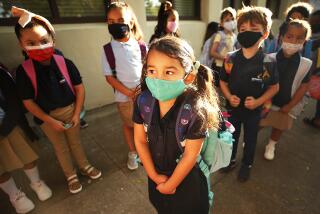H1N1 influenza pandemic is over, says World Health Organization
- Share via
The 2009-10 H1N1 influenza pandemic is officially over, the World Health Organization said Tuesday.
“The new H1N1 influenza has largely run its course,” WHO Director-General Dr. Margaret Chan said in a telephone news conference from Hong Kong. “We are now moving into the post-pandemic period.”
Some places may see localized outbreaks of the pandemic H1N1 virus, commonly called swine flu, she said, but overall activity is expected to be about normal for the season. In particular, she noted, out-of-season outbreaks are no longer being observed in either the Northern or Southern hemisphere.
One notable characteristic of swine flu was that it struck during periods when seasonal influenza is normally quiescent. It also proved more deadly to young people and children, unlike seasonal flu, which takes a higher toll on the elderly.
During its reign, the pandemic H1N1 virus displaced most seasonal flu viruses and became the predominant strain of virus — and often the only one — in circulation. Now, however, most localities are seeing a normal mix of flu viruses, Chan said.
Worldwide, 18,449 people have died from laboratory-confirmed pandemic H1N1 infections, according to the WHO, but the true toll is thought to be much higher because most victims aren’t tested.
The organization has been heavily criticized recently by some groups that charged that it inflated the dangers of the outbreak. Countries around the world have ended up with large supplies of unused vaccine against swine flu because the initial fears were not borne out.
But Chan said that the agency had followed its rules for declaring a pandemic and that those rules do not take into account the severity of the virus.
“We have been aided by good luck,” she said, and if the virus had mutated to become more lethal, “we would be in a very different situation today.”
She conceded, however, that the rules may need to be changed so that future declarations of a pandemic take into account the lethality of the virus.
thomas.maugh@latimes.com
More to Read
Sign up for Essential California
The most important California stories and recommendations in your inbox every morning.
You may occasionally receive promotional content from the Los Angeles Times.









